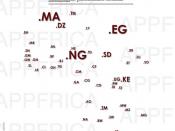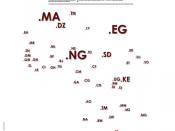Every domain name includes a top-level domain (often abbreviated to "TLD"). The responsibility for operating each TLD (including maintaining a registry of the second-level domains within the TLD) is delegated to a particular organisation. These organisations are referred to as "registry operators", "sponsors", or simply "delegees". There are two types of top-level domain and each of which has its own format, which is as below: -
(1) Generic top-level domain (often abbreviated to "gTLD")
(2) Country-code top-level domain (often abbreviated to "ccTLD")
A gTLD is the international governance framework in which policies for the administration and enhancement of the Internet's global Domain Name System (DNS) are developed and deployed. These policies are developed in cooperation with the Internet Assigned Numbers Authority (IANA), who manages the root of the Domain Name System (DNS) to promote stability and robustness. Any domain name that contains a generic top-level domain (gTLD) has the format as below: -
{registrant}.{gTLD}
Example of gTLDs include .com ("intended for commercial registrants") and .net ("intended for network providers, etc")
While for ccTLD, it is a country code top-level domain. These ccTLDs are administered independently by nationally designated registration authorities. There are currently 240 ccTLDs reflected in the database of the Internet Assigned Numbers Authority (IANA). WIPO, which has a ccTLD Program, has launched a database portal, facilitating online searches for information related to country code top-level domains. According to Arbitration and Mediation Center, ccTLD represents the domain in the top level of ICANN's global domain name system assigned according to the two-letter codes in the ISO 3166-1 standard. The standard, officially known as the Codes for the Representation of Names of Countries and their subdivisions, was introduced by the International Organisation for Standard (ISO) in 1974. Any...


